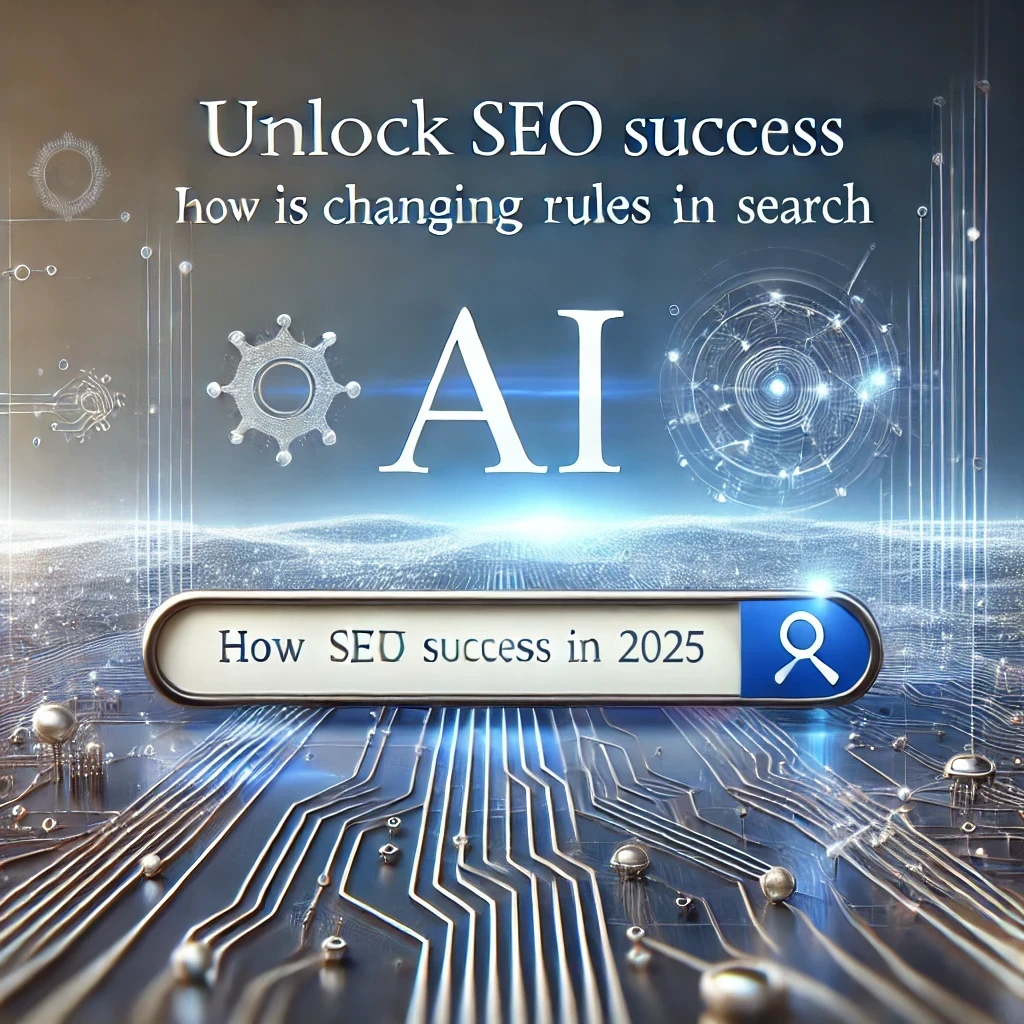
05 Nov Unlock SEO Success in 2025: How AI is Changing the Rules of Search
Unlock SEO Success in 2025: How AI is Changing the Rules of Search
The world of search engine optimization (SEO) has seen transformative changes, with artificial intelligence (AI) leading the charge. AI is reshaping SEO practices, offering innovative tools and changing how search engines interpret, rank, and serve content. For businesses and marketers aiming to stay competitive, understanding AI’s role in SEO is essential. This guide explores the transformative ways AI is influencing SEO, the tools available, best practices, and strategies to stay ahead.
What is AI in SEO?
AI in SEO involves the application of machine learning algorithms, natural language processing, and data analytics to improve the search engine optimization process. AI helps search engines understand the context and meaning behind user queries, making search results more relevant and personalized. For SEO professionals, AI-powered tools simplify tasks like keyword research, content creation, and performance tracking, enabling efficient, data-driven optimization strategies.
How AI is Transforming SEO: Key Areas of Impact
1. Enhanced Keyword Research and Content Optimization
Keyword research can be complex and time-consuming. AI-driven tools like Ahrefs, SEMrush, and Moz use machine learning to analyze vast datasets, quickly identifying keyword trends and search patterns. These tools can also suggest related keywords, search volume predictions, and ranking potential based on current competition.
For content optimization, AI tools like Surfer SEO and MarketMuse evaluate top-ranking content and provide specific recommendations on word count, structure, and keyword density for maximum relevance.
2. Voice Search Optimization
With the rise of AI-powered virtual assistants like Google Assistant, Amazon Alexa, and Apple Siri, voice search has grown significantly. Voice searches are more conversational and question-based, prompting SEO professionals to adapt content with natural, long-tail keywords that match spoken language.
- Use question-based keywords (e.g., “How does AI improve SEO?”)
- Incorporate conversational language and focus on local SEO for geographically specific queries
- Use structured data to provide context, increasing the chance of appearing in voice search results
3. Content Generation and Personalization
Content creation is central to SEO, and AI is changing how it’s done. Tools like ChatGPT and Copy.ai, powered by natural language generation (NLG), allow for scalable content production. While AI-generated content may need human editing, it speeds up tasks like blog posts, social media updates, and product descriptions.
AI also enables content personalization, tailoring it to user preferences and behaviors. This helps boost engagement metrics like click-through rates and dwell time, improving SEO rankings.
4. Predictive Analysis for Better SEO Strategy
Predictive analysis powered by AI helps marketers anticipate trends and user behavior, enabling proactive SEO strategies. Tools like BrightEdge and Crimson Hexagon analyze historical data to forecast trending keywords, high-engagement content types, and competitor strategies. This allows SEO professionals to craft content with greater precision.
5. Improved User Experience (UX) Through AI-Powered Analysis
User experience is crucial for SEO, as Google rewards sites with seamless, enjoyable user journeys. AI-driven UX tools like Hotjar and Crazy Egg provide heat maps and session replays to observe user interactions and identify areas for improvement.
By enhancing UX elements like page load time, navigation, and content flow, businesses can reduce bounce rates and improve dwell time—both key factors for better search rankings.
6. Semantic Search and Natural Language Processing (NLP)
Modern search engines now prioritize semantic search, aiming to understand a query’s meaning rather than simply matching keywords. NLP models like Google’s BERT (Bidirectional Encoder Representations from Transformers) enhance search engines’ ability to interpret context, synonyms, and sentence structure.
- Develop content clusters that cover topics in depth
- Use structured data to clarify content context
- Answer common questions related to the primary topic for NLP algorithms
AI-Powered SEO Tools to Consider
Here are some top AI-powered SEO tools to help you harness AI’s potential effectively:
- ClearScope: Uses AI to offer keyword suggestions based on competitor analysis, optimizing content relevance.
- Surfer SEO: Provides on-page optimization insights by comparing content to high-ranking pages.
- Frase: Assists in creating content briefs and provides AI-driven optimization suggestions.
- BrightEdge: Delivers AI-powered SEO recommendations, predictive insights, and content performance analysis.
- MarketMuse: Analyzes competition and suggests keyword strategies for effective content planning and optimization.
Best Practices for Leveraging AI in SEO
While AI offers significant benefits, integrating it into your SEO strategy effectively requires adhering to best practices:
- Prioritize High-Quality Content: While AI can identify trends and suggest topics, high-quality, unique content still reigns supreme. Focus on delivering insights that set you apart.
- Use Data Responsibly: AI tools provide ample data, but interpret it wisely. Combine AI insights with your industry knowledge and expertise.
- Balance Automation with Human Insight: AI automates repetitive tasks, but human creativity and judgment remain vital. Think of AI as a support tool, not a replacement.
- Optimize for Natural Language: With semantic search, AI algorithms prioritize natural language. Create content that flows naturally and addresses user intent.
- Stay Updated on AI and Algorithm Changes: AI technology and search algorithms evolve rapidly. Stay informed on the latest SEO tools and algorithm updates to remain competitive.
The Future of SEO with AI: What’s Next?
 AI will continue to redefine SEO, as advancements in predictive algorithms and NLP enable an even greater focus on understanding and meeting user intent. Google’s developments, such as BERT and MUM (Multitask Unified Model), hint at a more intuitive, conversational, and context-aware search experience.
AI will continue to redefine SEO, as advancements in predictive algorithms and NLP enable an even greater focus on understanding and meeting user intent. Google’s developments, such as BERT and MUM (Multitask Unified Model), hint at a more intuitive, conversational, and context-aware search experience.
The democratization of AI tools will empower small businesses to compete with larger brands by offering accessible data-driven insights. This trend promises effective solutions for keyword optimization, backlinking, content creation, and audience analysis.
Embracing AI for SEO Success
AI isn’t just a futuristic concept; it’s actively transforming SEO, offering smarter, faster, and more efficient ways to optimize for search engines. From predictive keyword research to enhanced content creation, AI allows marketers to adopt a data-driven, user-centric approach that aligns with search engine expectations.
The intersection of AI and SEO will present both opportunities and challenges. Businesses that learn to integrate AI into their SEO strategies will stand to gain through improved rankings, better engagement, and agility in a rapidly evolving digital landscape. Embrace AI-driven tools, stay informed, and watch your SEO strategy reach new heights in 2025 and beyond.
Take Your SEO to the Next Level in 2025
If you’re ready to leverage AI to boost your SEO strategy in 2025, Webociti can help. Our team specializes in cutting-edge digital marketing solutions that incorporate AI tools for optimized keyword research, content personalization, and enhanced user experience.
Contact us today to schedule a free consultation and discover how AI can transform your approach to SEO. Let’s get your business seen by the right audience with innovative, data-driven marketing strategies.


